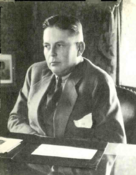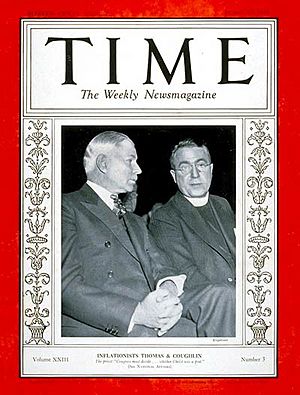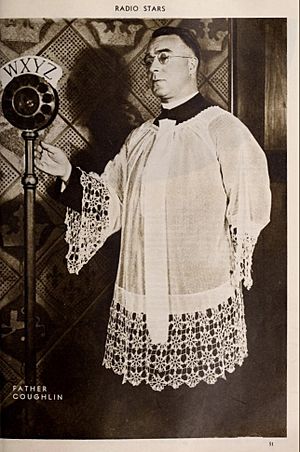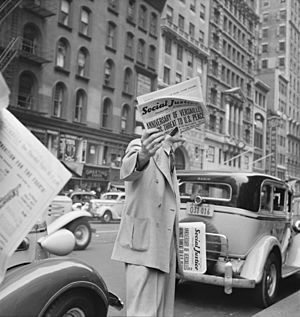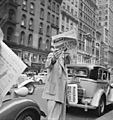Charles Coughlin facts for kids
Quick facts for kids The Reverend Monsignor Charles Edward Coughlin |
|
|---|---|
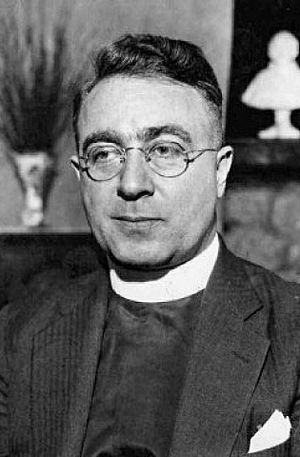
Father Coughlin c. 1938
|
|
| Church | Roman Catholic |
| Orders | |
| Ordination | 1916 |
| Personal details | |
| Birth name | Charles Edward Coughlin |
| Born | October 25, 1891 Hamilton, Ontario, Canada |
| Died | October 27, 1979 (aged 88) Bloomfield Hills, Michigan, U.S. |
| Buried | Holy Sepulchre Cemetery, Southfield, Michigan |
| Alma mater | St. Michael's College, Toronto |
Charles Edward Coughlin (born October 25, 1891 – died October 27, 1979) was a Catholic priest. He was born in Canada but lived in the United States near Detroit. Many people knew him as Father Coughlin. He started the National Shrine of the Little Flower church.
People called him "The Radio Priest" because he was one of the first leaders to use radio to talk to many people. In the 1930s, about 30 million listeners tuned in to his weekly shows. This was a huge number for that time!
Father Coughlin first supported President Franklin D. Roosevelt and his New Deal plan. But later, he strongly disagreed with Roosevelt. He started talking about controversial ideas, including antisemitic (anti-Jewish) views. He also supported some ideas from Nazi Germany and Fascist Italy.
His main topics were about politics and money, not just religion. His slogan was "Social Justice." After World War II in Europe began in 1939, the government stopped his radio show. They also stopped his newspaper, Social Justice, from being sent by mail. After this, Father Coughlin mostly stayed out of public life. He worked as a church pastor until he retired in 1966. He passed away in 1979 when he was 88 years old.
Contents
Early Life and Becoming a Priest
Charles Coughlin was born in Hamilton, Ontario, Canada. He was the only child of Irish Catholic parents, Amelia and Thomas Coughlin. His family lived in a working-class area. His mother was very religious and taught him a lot about faith.
He went to St. Michael's College in Toronto in 1911. This college was run by a group of priests called the Congregation of St. Basil. After college, Coughlin joined this group. He studied to become a priest and was ordained in Toronto in 1916. He then taught at Assumption College in Windsor, Ontario.
In 1923, his religious group changed some of its rules. Coughlin could not agree with these new rules, so he left the group. He then moved to the United States, to Detroit, Michigan. This city was growing fast because of the car industry.
In 1926, he was assigned to a new church called the Shrine of the Little Flower. This church was in Royal Oak, Michigan. At first, there were only about 25 Catholic families in the church. But Coughlin's powerful speeches quickly made the church grow.
Becoming a Radio Broadcaster
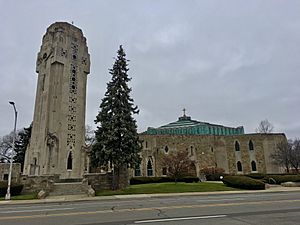
In 1926, Father Coughlin started broadcasting his Sunday sermons on a local radio station, WJR. He was worried about groups like the Ku Klux Klan burning crosses near his church. He also needed money to pay back a loan for his church building. His weekly radio show spoke out against the KKK. This appealed to many Irish Catholic listeners.
In 1929, a new owner, George A. Richards, bought WJR. He encouraged Coughlin to talk more about politics instead of just religion. Coughlin's broadcasts became very strong. He started criticizing the banking system and Jewish people. In 1930, CBS picked up his program for national broadcast. The radio tower he used for his sermons was finished in 1931.
His Views and Popularity
In 1930, Coughlin began to speak against socialism and Soviet Communism. The Catholic Church was also against these ideas. He also criticized rich capitalists in America. He said their greed made communist ideas seem good to working people.
In 1931, the CBS radio network stopped Coughlin's program. They wanted to check his speeches before he broadcast them, but he refused. So, Coughlin started his own radio network. It was called The Golden Hour of the Shrine of the Little Flower. By 1938, his network had 58 stations. It became the largest independent radio network in the U.S.
Over the 1930s, Coughlin's views changed a lot. He even started to question the value of elections. He also spoke against Prohibition, which was a law that banned alcohol.
Supporting and Opposing President Roosevelt
During the Great Depression, Coughlin strongly supported Franklin D. Roosevelt in the 1932 election. He was an early supporter of Roosevelt's New Deal plans. He even made up the phrase "Roosevelt or Ruin." He also said, "The New Deal is Christ's Deal." In 1934, Coughlin spoke to Congress. He said that if Congress did not support Roosevelt's money plans, there would be a revolution.
However, President Roosevelt was not very interested in Coughlin's ideas about money. So, Coughlin's support for Roosevelt faded in 1934. He started a group called the National Union for Social Justice (NUSJ). This group wanted changes like nationalizing big industries and protecting workers' rights.
Coughlin believed the Great Depression was a "cash famine." He wanted to change the money system. He also did not like that Roosevelt recognized the Soviet Union. Studies show that Coughlin's broadcasts caused Roosevelt to lose some votes in the 1936 election.
His Economic Ideas
Coughlin wanted Roosevelt to use silver to increase the amount of money in the country. He also wanted to change the financial system. These ideas were not accepted.
The NUSJ believed in things like guaranteeing jobs and income for everyone. They wanted to nationalize important industries. They also wanted to tax rich people more to share wealth. They supported workers' unions and believed the government should control some assets for the public good.
His Huge Radio Audience
By 1934, Father Coughlin was a very famous Catholic speaker on politics and money. Millions of people listened to him every week. He received more than 10,000 letters every day. Some estimates say that one-third of the country listened to his shows.
When Coughlin started criticizing the New Deal, Roosevelt sent Joseph P. Kennedy Sr. (father of President John F. Kennedy) to talk to him. Kennedy was a friend of Coughlin's. But Coughlin kept attacking Roosevelt, saying he was controlled by Wall Street. Kennedy later warned that Coughlin was becoming "a very dangerous proposition." Kennedy worked with church leaders to try and silence Coughlin.
Coughlin said in 1935 that he would fight against "rottenness of modern capitalism" and also against Communism. His NUSJ group became popular among people who disliked the Federal Reserve. They felt that Wall Street and Communism were both evil.
Coughlin supported politician Huey Long until Long was killed in 1935. In 1936, Coughlin joined with other leaders to support William Lemke for president. One of Coughlin's slogans was "Less care for internationalism and more concern for national prosperity." This idea appealed to many Americans who wanted the U.S. to stay out of other countries' problems.
Controversial Antisemitic Views
After the 1936 election, Coughlin started to show support for the fascist governments of Adolf Hitler and Benito Mussolini. He saw them as a way to fight Communism. He believed that Jewish bankers were behind the Russian Revolution. He also supported a far-right group called the Christian Front.
Coughlin spread his ideas through his radio shows and his weekly magazine, Social Justice. In 1938, his magazine printed parts of a fake anti-Jewish text called The Protocols of the Elders of Zion. Even so, Coughlin said he was not antisemitic. But he did receive money from Nazi Germany during this time. A newspaper report from Berlin called Coughlin "the German hero in America."
In February 1939, a Nazi group in America held a big rally in New York City. Coughlin quickly said he had nothing to do with them. He said that groups that spread "racial hatreds" were wrong.
On November 20, 1938, after Kristallnacht (a Nazi attack on Jewish people and their businesses), Coughlin made a shocking statement. He said that "Jewish persecution only followed after Christians first were persecuted." After this speech, three radio stations stopped broadcasting his program. They said he was causing racial prejudice. One station president said Coughlin's speech was "calculated to stir up religious and racial hatred."
In December 1938, thousands of Coughlin's followers protested outside one of the radio stations. Some protesters yelled anti-Jewish statements. The protests continued for several months.
Stopping His Broadcasts
Most Catholic leaders did not approve of Coughlin. But only his boss, Bishop Michael Gallagher of Detroit, could stop him. Bishop Gallagher supported Coughlin.
Coughlin kept attacking President Roosevelt's policies. The government decided that while free speech was protected, radio broadcasting was a "limited national resource." So, they could regulate it. The government made new rules that forced radio broadcasters to get permits.
When Coughlin's permit was denied, he was temporarily silenced. He tried to get around the rules by buying air time and playing recorded speeches. But this cost a lot of money and reduced how many people he could reach.
Then, Bishop Gallagher died, and a new bishop, Edward Aloysius Mooney, took over. Bishop Mooney was not as supportive of Coughlin. In 1939, a group called the Institute for Propaganda Analysis used Coughlin's radio talks to show how propaganda works.
After World War II began in Europe in September 1939, Coughlin asked his listeners to go to Washington. He wanted them to stop the repeal of laws that kept the U.S. neutral. This led to the National Association of Broadcasters (NAB) stepping in. The NAB made new rules that limited how much air time could be sold to controversial people. This rule was made specifically because of Coughlin. In September 1940, Coughlin announced that he had been forced off the air.
Newspaper Shutdown and End of Public Life
Coughlin said that even if the government could control radio, the freedom of the written press was still protected. So, he kept printing his ideas in his newspaper, Social Justice. After the Japanese attack on Pearl Harbor in December 1941, the U.S. entered World War II. People who wanted the U.S. to stay out of the war, like Coughlin, were seen as sympathizing with the enemy.
The Roosevelt government acted again. In April 1942, the U.S. Attorney General suggested stopping Social Justice from being sent by mail. This would make it very hard for Coughlin to get his paper to readers.
The government temporarily stopped the mailing permit for Social Justice. They also thought about charging Coughlin with sedition (trying to cause a rebellion). To avoid a big trial, the government talked to Bishop Mooney. Bishop Mooney was told that if he ordered Coughlin to stop his public activities, the government would deal with him quietly.
So, on May 1, Bishop Mooney ordered Coughlin to stop all his political activities. He was told to only focus on his duties as a parish priest. If he refused, he could lose his priestly powers. Coughlin agreed to the order. He remained the pastor of the Shrine of the Little Flower. The hearing about his newspaper was canceled.
Later Life
Even though he had to stop his public career in 1942, Father Coughlin continued to serve as a church pastor. He retired in 1966.
He passed away in Bloomfield Hills, Michigan, in 1979 at the age of 88. Church officials said he had been sick for several weeks. He was buried in the Holy Sepulchre Cemetery in Southfield, Michigan.
Images for kids
See also
 In Spanish: Charles Coughlin para niños
In Spanish: Charles Coughlin para niños
- Clerical fascism
- Fascism in North America
- Huey Long
- Radio propaganda
 | Delilah Pierce |
 | Gordon Parks |
 | Augusta Savage |
 | Charles Ethan Porter |


